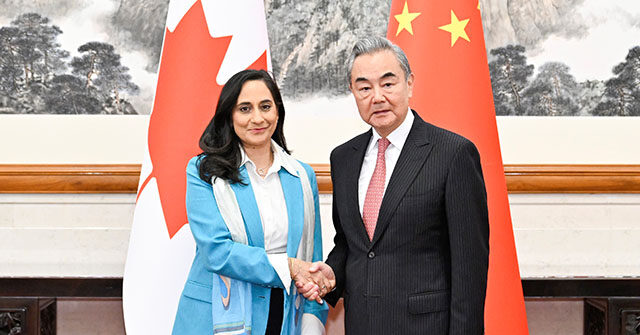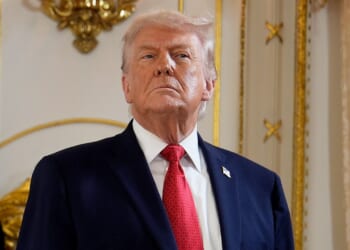Canadian Foreign Minister Anita Anand on Monday hailed communist China as a valuable strategic partner, a dramatic turnaround from years of tense relations between Ottawa and Beijing necessitated by Canada’s deteriorating relationship with the United States.
Anand told the Canadian Press that the key to building a better relationship with China was “going beyond allowing individual irritants to strain the entire relationship and permitting Canada to advance its economic and security interests.”
“It’s necessary for us to lay the foundation, if we are going to find areas where we can further co-operate,” she said.
“There are going to always be challenges in any relationship. The key is to be able to have the dialogue necessary to address the issues of Canadian concern,” she explained.
“We must be nuanced in our diplomacy. We must stress our concerns relating to security and public safety on the one hand, and we must seek to build additional supply chains on the other. That is pragmatism,” she argued.
The sort of “irritants” and “challenges” Anand dismissed so blithely included China kidnapping Canadian citizens to bend Ottawa to its will, China interfering outrageously in Canadian politics, and China maintaining secret police stations to oppress its citizens living in Canada.
The Canadian Press recalled that only three years ago, Canada’s Indo-Pacific strategy document labeled China an “increasingly disruptive global power” with “interests and values that increasingly depart from ours.”
As recently as the last Canadian election, prime minister candidate Mark Carney – frequently criticized as being much too close to China – identified Beijing as Canada’s “biggest security threat.” He mentioned China’s support for Russia and its threats to Taiwan as reasons for viewing China with deep suspicion.
Canada viewed China as a massive threat even though it had a literal “strategic partnership” agreement with China dating back to 2005. One of the reasons Anand is waxing poetic about the partnership is that she just met with Chinese Foreign Minister Wang Yi last Friday to celebrate the 20th anniversary of the Canada-China Strategic Partnership agreement, and commemorate 55 years of diplomatic ties between the two countries.
Even in times of tense relations, China was one of Canada’s largest trading partners, usually eclipsed only by the United States. As of 2024, the U.S. had $924 billion in bilateral trade with Canada, versus $118 billion for China.
As those numbers might suggest, China is in no position to take over from the United States as Canada’s top trading partner, but it is no mystery why Carney’s administration is suddenly treating the Chinese like dear friends.
An enraged President Donald Trump canceled all trade talks with Canada on Friday after the government of Ontario province ran a political ad quoting Ronald Reagan to criticize Trump’s trade policies. The Ronald Reagan Foundation quickly backed up Trump’s accusation that the Reagan clip was deceptively edited and suggested it was considering legal action against Ontario.
Conservative Member of Parliament Michael Chong, who was the target of Chinese election interference in 2021 after he spoke out against the Uyghur genocide, on Thursday accused Carney and Anand of hypocrisy for cozying up to Beijing:
China’s strategic threat to Canada is by no means theoretical. The Canadian Armed Forces have been conducting drills in the frozen northern reaches of the country to practice repelling Chinese and Russian ambitions in the Arctic Circle. Valuable mineral deposits and trade routes have made the region of keen interest to Beijing, so Canada is keeping a close eye on Chinese ships and planes in the Arctic.
Writing at the National Post last week, Joel Kotkin of Chapman University – by no means a fan of President Trump – argued that Carney is delusional to believe China could, or should, take America’s place as Canada’s top trading partner:
China’s historic strategy focuses not on establishing colonies but vassal states from which it can draw what it lacks, mainly raw materials, and customers for its increasingly sophisticated industrial machine. This is precisely why China has targeted Southeast Asia, Africa and Latin America, keeping them as suppliers of rare metals, copper, and foodstuffs.
In virtually no case does China try to lift up its client states to the status of competitors, as the U.S. did for Japan, Italy, Germany, South Korea, and Taiwan. China knows what it wants. In terms of strategic materials — a major trade issue — China has systematically secured preferential access through long-term partnerships that exclude American or Western competitors.
“We should strive to keep up a system that, despite all its flaws, has provided a better way of life for millions not only from Europe but from around the world. This is the basis for a long-term friendship and alliances, which can’t be destroyed either by the brutalities of Trumpism or the banalities of Canada’s own establishment,” Kotkin concluded.

















